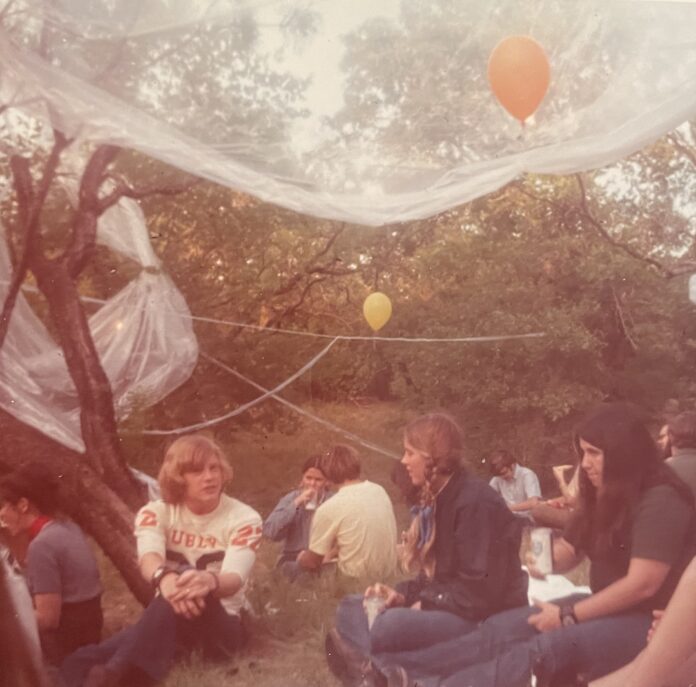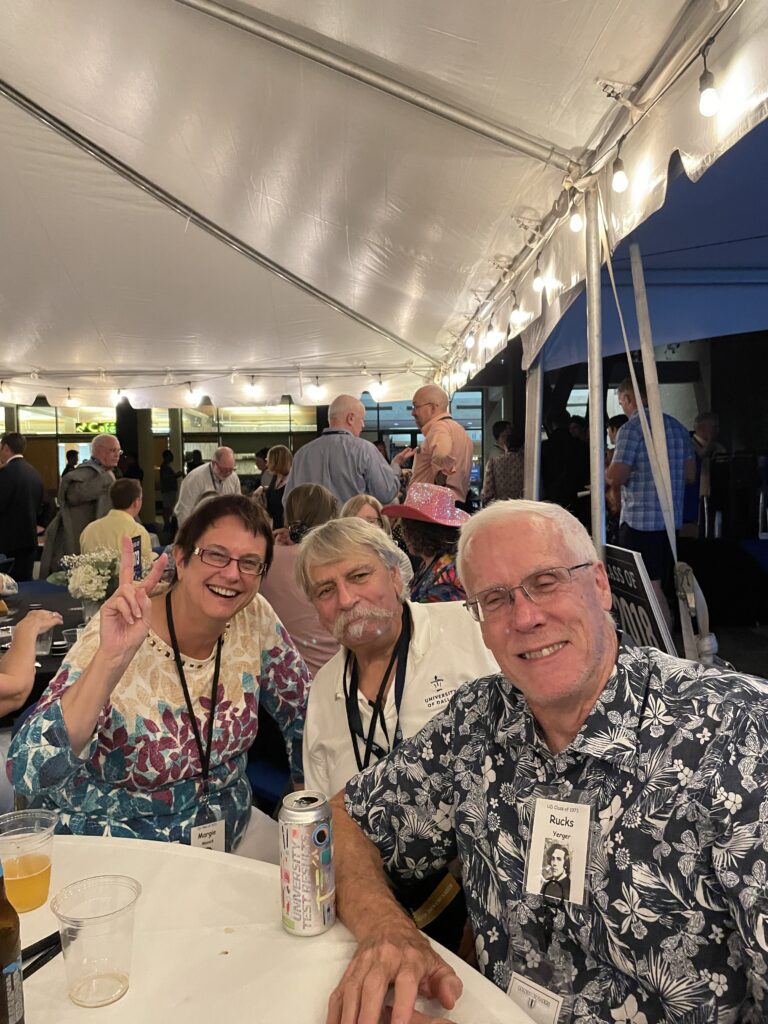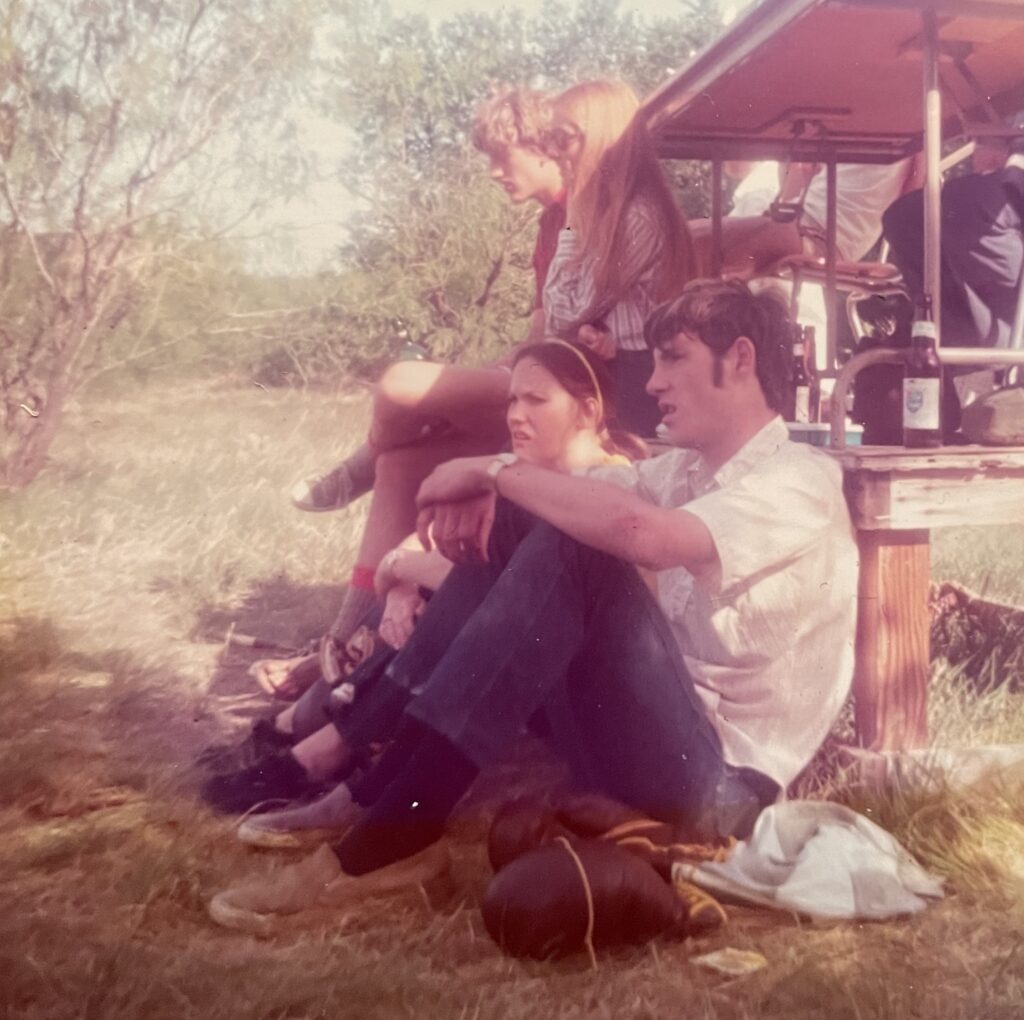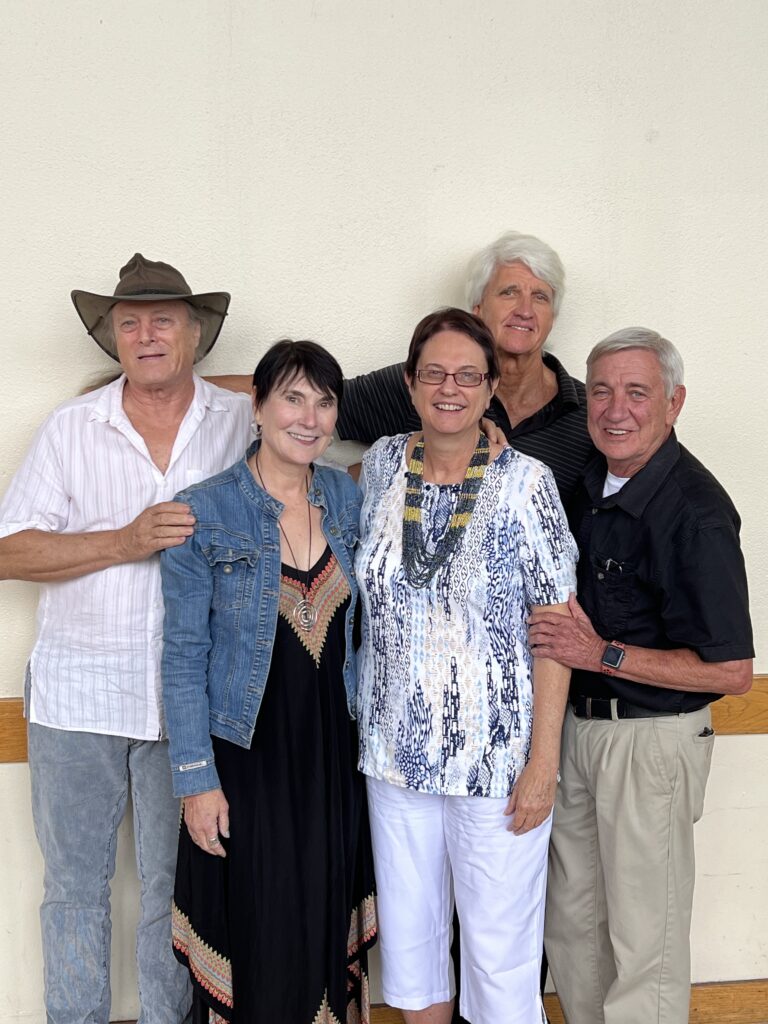
The class of 1973 celebrates half a century of friendship, fellowship and fun
During the 2023 University of Dallas Alumni & Family Weekend from Friday, Sept. 29 to Sunday, Oct. 1, the class of 1973, affectionately known as the Forkers, celebrated their 50th reunion.
Now a class of “Golden Crusaders” – members of the classes between 1960 and 1973 – the Forkers were the first class in UD history to experience a semester abroad in Rome. Their time was marked by both timeless UD experiences such as Groundhog, Charity Week and parties in the woods, as well as those unique to their time, such as protesting the Vietnam War.
The 2023 class reunion was a great success, boasting an impressively high 20% turnout rate.
“We think that we had between 45- 50 alumni participate out of a graduating class of about 235,” said Margie Mosack, class of ‘73. “Julie Abell, the Director of Development at UD told me that in the four years that she has been in that position, our class had the largest turnout that she has seen.”
Despite having been separated by time and space for many years, the class of ‘73 had not been separated emotionally by an inch.
“Though, in many cases, 50 years has transpired since we were last together, we all got along quite well and had no trouble picking up the traces, enjoying each others’ company and sharing our life’s journeys,” said Joe Hasler, class of ‘73.
While eating lunch in the Cafe with 10 of her fellow classmates during the reunion weekend, a freshman sitting at the table next to them struck up a conversation with Mosack and her posse.

“She began asking one of our classmates questions about the school and campus when we attended UD,” said Mosack. “As she watched our interactions, she told our classmate John Hasler, ‘You are not just classmates; you are friends. I hope that my class will be like you.’”
The class of ‘73 was heavily involved in preparing for the 50th reunion, often in creative ways. Eli Zlokas designed and provided the reunion shirts, while Scott Davison wrote the history of the Forkers in the style of the “The Iliad” for the reunion booklet. In a similar vein, Greg Rogers wrote poems on the Tower bells and their saints. Richard Fougerousse and his rock band House Special played live on the Mall the night of Saturday, Sept. 30.
“Joe Hasler and Michael Phillips and I worked on the reunion planning and contacting folks for about 18 months,” said Mosack. “Then in the last few months, we had 15 classmates volunteer on the committees.”
Before the official reunion in 2023, an unofficial reunion had been organized four years prior in 2019 by Zlokas, Pete Kraeger and Mosack.
“One of our classmates, Eli Zlokas called me in early 2019 and asked if I knew that one of our classmates, Bob Houssiere, had died. I had not heard that. Eli said that he and some of the men in our class decided that we should not wait four years to celebrate our 50th anniversary [r]eunion because they did not want to lose any more class members,” said Mosack.
The class of ‘73’s closeness may be in part due to the class experiencing the first Rome semester, a trip that typically forms very tight bonds. Despite the experimental nature of the program, the bare outline of their experience is familiar. Everyone took the same classes four days a week with three-day weekends left open for traveling. In lieu of Ryanair, hitchhiking and the Eurail were the preferred means of transportation.
Although their program did not include the expansive Northern Italy, Umbria and Greece class trips of the contemporary Rome semester, they did tour Greece, celebrate Mass in the catacombs and witness a papal audience.
Instead of the Due Santi campus, the Rome Forkers lived in a convent owned by the School Sisters of Notre Dame on the Via Aurelia in Rome during their semester abroad. The girls were treated to the top floor.
“We each had a bed and a cabinet for our clothes,” said Mosack. “The boys lived in the basement.”
“We had classes downstairs and there was a library. The grounds were lovely. There was a volleyball/basketball court,” she said. “We celebrated [Groundhog] Day in the woods below the convent on the grounds.”
The class was defined by more than just their pioneer status in the Rome program.
“The class of 1973 was unique insofar as we had many 4.0 students in our numbers, from day one,” said Hasler, describing the intellectual prowess that defined his class. “Many of those same ‘geniuses’ have gone on to be leaders in our world community as professors, lawyers, doctors and PhD’s who have impacted many lives with the vision and inspiration of the University of Dallas.”
Mosack emphasized the gusto with which the Forkers engaged the Great Books. “We also took seriously what we were learning in the Core Curriculum,” she said. “There were often animated conversations in the dorms, the cafeteria, or at Club Schmitz, a local dive bar, on Art, Literature, Politics, Film and Philosophy over a beer and a burger.”
The class’s zealousness was found inside and outside the class- room, often bubbling up in the form of good-natured fun.
“We were a creative class. We were never bored and made our own fun,” said Mosack. “There were shenanigans, such as the boys somehow getting the old horse Crusader into the boys’ dorm. One day two of the girls completely switched two other girls’ rooms in the dorm – posters, clothes, drawers, furniture, everything.”
One particular example of the Forkers’ fun was the legend of the “Irving 22”.
“Rather than attend the Chrysanthemum Ball in the fall before Rome, many in our class decided to save our money and just party at Groundhog Park that night,” said Mosack. “I suggested the name, ‘The Dandelion Ball,’ the cheaper cousin to the Chrysanthemum Ball.”
Mosack had left the party early, but when she awoke in the middle of the night, she noticed many of the girls’ doors were still open – too many for them all to be breaking curfew. Scott Davison had left the party to drive some- one back to the boys’ dorms, but when he returned the lights were still on, the music was still blasting, the kegs were still out – but the students were gone.

“He started walking around looking for everyone. Scott said that suddenly ‘a creature-like figure, drip- ping with foul Trinity River water,’ appeared out of the darkness,” said Mosack. “He told Scott that the Irving Pol ice had raided Groundhog Park and he himself had jumped into the river to escape capture. It was a dry county and there were underage drinkers at the Park.”
Davison returned to campus and contacted Dean Fougerousse. The story has it that the two of them went back to the jail to negotiate the release of the 22 students who had been arrested.
It came to light that, contrary to the law at the time, men and women had been transported to the police station in the same paddy wagons. When Fougerousse pointed this out to the officers, they deemed it wise to let the students off without pressing charges. These individuals came to be known as the infamous “Irving 22.”

Since Groundhog Park was being watched by the Irving police, the class of ‘73 decided to found Fork- er Park, which was located in the woods where the sports fields behind Clark Hall and the student apartments currently are, and inaugurate them with the first Forker Park Olympics.
The Forkers’ enduring camaraderie demonstrates that the bonds forged during one’s time at UD are bonds that go unbroken, embodying the timelessness of friendship, intellectual curiosity and the unique spirit of the University of Dallas.